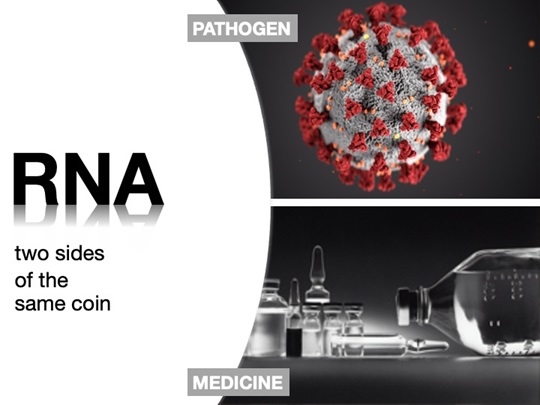Why Support RNA Research?
 2020 was a challenging and scary year for most of the 7.8 billion people on planet earth— and for many, the words Ribonucleic Acid or RNA suddenly became very important
and extremely relevant to their daily lives. In late 2019 a novel RNA virus, SARS-CoV-2, emerged as a deadly human pathogen that rapidly spread worldwide, shuttering economies, straining health care systems, sickening tens of millions, and killing
millions.
2020 was a challenging and scary year for most of the 7.8 billion people on planet earth— and for many, the words Ribonucleic Acid or RNA suddenly became very important
and extremely relevant to their daily lives. In late 2019 a novel RNA virus, SARS-CoV-2, emerged as a deadly human pathogen that rapidly spread worldwide, shuttering economies, straining health care systems, sickening tens of millions, and killing
millions.
Fortunately, in mid-December 2020, RNA made front-page news once again… this time emerging as a protector rather than a villain. This protection came in the form of the mRNA-based vaccines developed and produced by Pfizer-BioNTech (95% efficacy) and Moderna-NIH (94% efficacy), respectively.
These vaccines reached the clinic at recording-breaking speed, approximately 11 months from inception to approval, yet represent YEARS of hard work by RNA researchers around the world.
RNA biology has emerged as one of the most influential areas in modern biology and clinical science. The discovery of numerous new classes of RNAs and their function in a wide spectrum of biological processes has revolutionized molecular biology and has profound implications for the future of clinically relevant diagnostics and therapeutics.
Unfortunately, major knowledge gaps limit our full understanding of RNA biology. Much remains to be uncovered about RNA and the vast and complicated ways it regulates cellular biology and disease. Key areas of research that demand new and sustained funding include elucidation of RNA biogenesis and structure, identification of RNA subclasses and their function, determination of the role of RNA in disease, and development of the technology and computational expertise needed to translate “wet lab” innovations to the bedside.